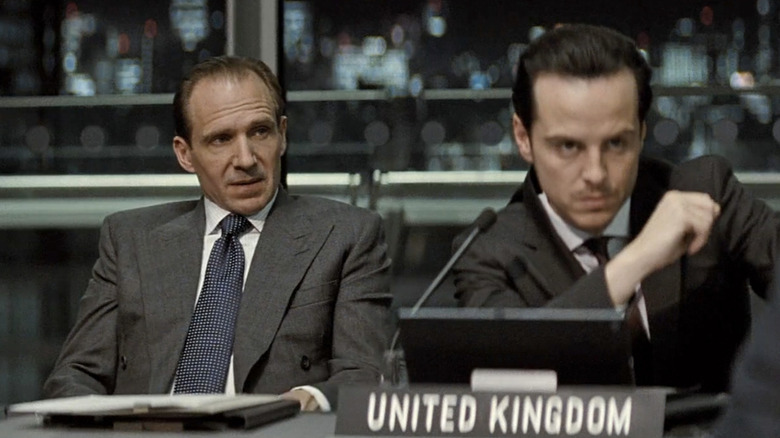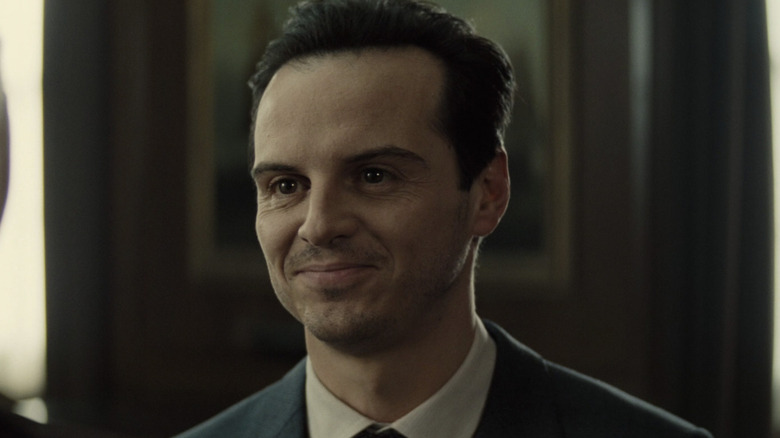Andrew Scott Isn't A Big Fan Of His Performance In Spectre
Daniel Craig isn't the only actor who wasn't exactly the biggest fan of his time in the 2015 James Bond film "Spectre." Before its release, "Spectre" was highly anticipated, mainly because it was the follow-up to the critically successful "Skyfall," with Sam Mendes returning to the director's chair. The movie had lofty ambitions, as the story and plot were meant to turn the Daniel Craig series of films into one cohesive narrative. The final result is a mixed bag, as "Spectre" feels like a bloated film that is inconsistent in tying together the Craig films of the past.
Andrew Scott played a small but crucial role in "Spectre" as a character with the codename C, acting as a foil to the new M (Ralph Fiennes). C championed a different kind of intelligence apparatus that would see the dissolution of the '00' field agents, and became a personification of the themes "Skyfall" introduced, giving voice to questions about the relevance of 007 and the operatives' place in modern espionage. While C wasn't the main antagonist, he did have a connection to the shady Spectre organization and played an instrumental role in their plan to acquire access to critical British intelligence. Interestingly, Andrew Scott looks back on the role as one where he essentially played it too safe.
Scott admits being 'a little intimidated'
In an October 2022 video interview with Vanity Fair, Andrew Scott talked about his career and a wide variety of roles. When it came time to talk about his part in "Spectre," the actor recalled his history with Sam Mendes and how he got the role of C. Unfortunately, Scott believes that the scale of the project got the better of him, leading to what the actor sees as a performance that didn't take enough chances:
"I'd worked with Sam Mendes in the theater. We did a play on Broadway together with Bill Nighy and Julianne Moore, and I loved working with them, so I was thrilled to be asked. I found it difficult to be in that film. I think I could've just been a bit better. I think I allowed myself to be a little intimidated by the budget and the history of the franchise, and I don't think I attempted enough to be original."
No matter how Scott believes the performance turned out, he still saw it as a valuable learning experience. Looking back on the role and how differently he could have approached it, the actor determined that experimentation and letting yourself be loose with a role is what leads to a better performance.
'It doesn't matter what the budget of a movie is'
Scott elaborated on his learning experience from "Spectre," stating that no matter the size of the production, the same thing about an actor's performance will always be important:
"I think I was just maybe just not very confident, and one thing that I've definitely learned since then is that it doesn't matter what the budget of a movie is. The same thing matters. It's just simply about really good stories and stuff, and so it's just to remember that as an actor, the space between action and cut is exactly the same in a small-budget movie as it is in a huge-budget film. So to attempt to still be relaxed and to experiment, I think, to make a mistake and to make a fool of yourself is important."
"It doesn't matter what the budget of a movie is" could serve as inspiring words to more than just actors. Scott's learning experiences from "Spectre" could help writers, directors, and film professionals of all kinds understand that they should approach projects with the same confidence, dedication, and passion, no matter the scale or budget they're working with. After all, even a film series as vast and rich as the "James Bond" series needs experimentation to help keep things fresh and exciting.


